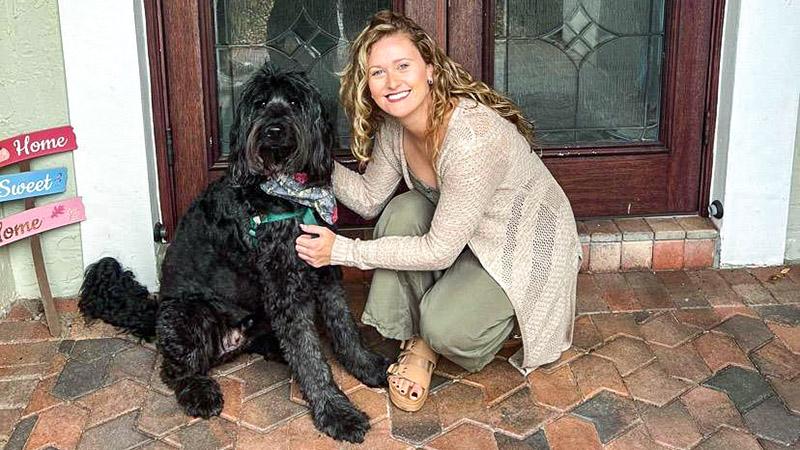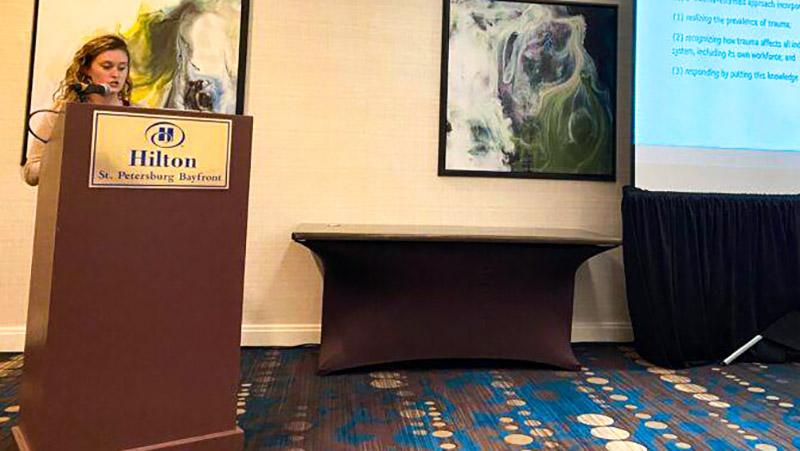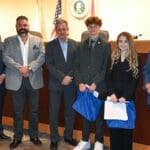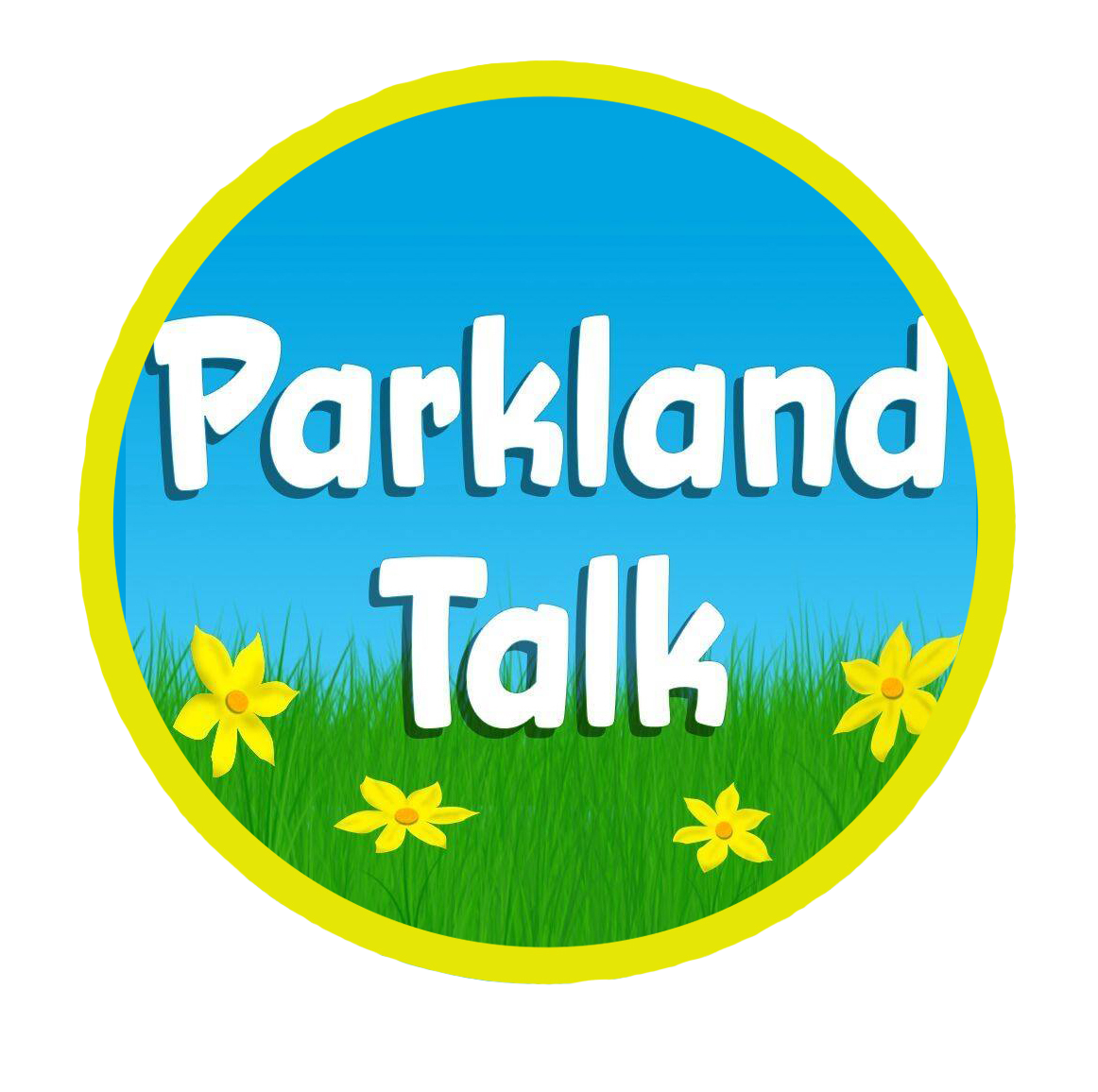
Archambault with her therapy dog, Dougie {Courtesy}
By Bryan Boggiano
Marjory Stoneman Douglas High School teacher, Rachel Archambault, found her life and the community irrevocably changed on February 14, 2018, a day that began like any other but ended in tragedy.
Archambault recalls everything started normally that day. It was Valentine’s Day, and the campus was full of oversized teddy bears, chocolates, and other holiday goodies.
She wore a pair of red heels that day, and her coworker, security guard, and coach, Aaron Feis, took her to her classroom in the 500 Building on his golf cart, which she estimates was about 50 yards from the 1200 Building.
“It started as a cute day from what I remember,” she said.
After a fire drill around 9 a.m., Archambault, a speech-language pathologist (SLP), remembered the day going smoothly until about 2:25 p.m. At that time, the fire alarm went off again, and as she opened the door to leave her classroom, she heard gunshots and saw students running and screaming.
Immediately, Archambault grabbed two students in the hallway, rushed them inside, and locked the door. She hid with another teacher and her students for two-and-a-half hours before a SWAT Team freed them.
Despite being in an adjacent building to the shooting, Archambault thought she would die. A student in the room next door was hyperventilating loudly, and she felt they were being held hostage.
“We know now what was happening, but when it was happening, we had no idea where anything was,” she said.
In the days and weeks that followed, Archambault had issues sleeping, became emotionally dysregulated, and lost 20 pounds.
“I lost friends and coworkers, and it was very painful,” she said. “Any of my students who were in that building were so different after. It was really hard to see them go through that.”
After returning to school, Archambault noticed students did not feel safe and were not meeting milestones. She was also experiencing the onset of PTSD.
To help herself and her students feel safe, she began researching how to integrate trauma-informed care into her curriculum. There was no rule book on integrating trauma-informed care for SLPs or speech specialists. As a result, she started researching and identifying best practices from the ground up. For her students, this was even more important.
“We know that the prevalence of trauma in students with learning disabilities [and speech difficulties] is higher than the general population because they can’t communicate what’s going on a lot of times,” Archambault said.
When school ended that June, she felt isolated and had difficulty leaving her home that summer. As a result, she adopted a therapy dog, Dougie, whom she credits with getting her through the challenges she faced due to the MSD tragedy.
With Dougie, she volunteered with and contributed to Canine Assisted Therapy, an organization that supports therapy dogs.
SLPs like Archambault work to address and mitigate speech, language, communication, pronunciation, and swallowing difficulties in youth and adults, even working with children who have reading or speech delays or are on the autism spectrum.
Archambault’s research focuses on integrating trauma-informed care into the field to understand how trauma might affect one’s abilities and aims to empower those who have experienced it. It seeks to reduce the chance of re-traumatization and understand how specific cues can affect people.
Despite her wide-reaching hope to help others, Archambault did not see herself doing the work she had done so broadly. Her interest in the field started on a much smaller scale, in her own home.
Archambault said she was first introduced to SLP when she observed her younger twin brothers, Kyle and Jesse, with a speech therapist at home.
The therapist, she said, used candy to get them to speak. Besides having a sweet tooth and wanting that candy herself, Archambault said the therapist made learning fun for her brothers.
Her aspirations solidified further as she watched how her teachers at Ramblewood Middle School and J.P. Taravella High School engaged with their classes. She took that interest to the University of Central Florida, where she earned a degree in communication sciences and disorders in 2013, earning her masters in 2016.
Later that year, she started working at Marjory Stoneman Douglas, and despite moving to Fort Lauderdale, her coworkers and students made it worth the 40-minute drive to work every day.
By the tragedy’s first anniversary, she felt ready to speak out and help other SLPs and trauma survivors.

Rachel Archambault speaking at the 2022 FLASHA Convention in St. Petersburg, Florida
That year, she created PTSD SLP on Instagram, designed for other SLPs to learn more about trauma-informed care and as a way for others experiencing trauma to reach out. While she shares self-care tips and best practices for those in the field, the account helped expand Archambault’s reach beyond the community.
After every subsequent school shooting, Archambault prioritizes sending that school’s SLP information about her. She also includes all of the research on trauma-informed care she compiled.
With gun violence in schools continuing, Archambault stated that trauma-informed care would become increasingly more important for SLPs to understand and implement.
But not everyone with whom Archambault came into contact had been affected by school violence or shootings. One SLP who contacted her had survived the 2017 Las Vegas shooting. That SLP, Archambault said, has since become one of her biggest supporters.
Additionally, Archambault stated she had college students reach out to her nationwide, asking her to speak about trauma-informed care in their classrooms. Most students had yet to learn about trauma-informed care in their coursework and wanted to know more. Recently, she noticed more programs starting to teach about it, but she hopes the material continues to expand.
She spoke at the SLP Summit, a virtual conference, on January 11, where more than 2,000 people watched her presentation. Before that, she spoke at three annual conventions for the Florida Association of Speech-Language Pathologists and Audiologists (FLASHA), including the 2022 event in St. Petersburg.
After speaking at each convention, Archambault states that most participants wanted to learn more about trauma-informed care. Even though research is still limited, she says it is encouraging it’s getting more attention.
Still, she implores college-aged students to ask their professors for more information on the subject.
“They want to be able to support all of their students,” she said. “We’re in a profession of helpers; they want to help as much as they can.”
Archambault estimates she has also created 30 podcasts for industry professionals discussing her research and trauma-informed care experience. She also received multiple accolades and honors for her work. In 2020, she won the America Speech Language Hearing’s Distinguished Early Career Professional Award. In 2021, UCF recognized Archambault on its annual 30 Under 30 list.
“[My work] helps put a face to trauma that sometimes people can’t understand unless they have a personal connection to it,” she said.
In 2021, Archambault left MSD and became the Broward County Public Schools speech-language pathology program specialist.
“It was sad to leave the school,” she said. “It was hard to be there [after February 14], but I miss it a lot, and I miss the students.”
Despite the job change, she feels strongly connected to the MSD community. She remains in contact with her former students and their families and stays in touch with former coworkers, who commend her for her work.
“Even though I’m not at Douglas, I’m still there often, and I’m still part of that community, and I will be part of that community forever,” she said. “I’m working to make sure that [the MSD community] is always thought of.”
Send your news to Parkland’s #1 Award-Winning News Source, Parkland Talk. Don’t miss reading Tamarac Talk, Coral Springs Talk, Coconut Creek Talk, and Margate Talk.
Author Profile

Related
 NewsNovember 22, 2023Parkland City Commission Recognizes 2 ‘Mayor for a Month’ Participants
NewsNovember 22, 2023Parkland City Commission Recognizes 2 ‘Mayor for a Month’ Participants NewsNovember 13, 2023Jordan Isrow Named Parkland’s New Vice Mayor
NewsNovember 13, 2023Jordan Isrow Named Parkland’s New Vice Mayor NewsNovember 12, 2023Parkland Commission to Vote on $600K in Upgrades for Wedge Preserve Park Development
NewsNovember 12, 2023Parkland Commission to Vote on $600K in Upgrades for Wedge Preserve Park Development NewsNovember 3, 2023Soldier Rush Obstacle Course Competition Races into Parkland Nov. 11
NewsNovember 3, 2023Soldier Rush Obstacle Course Competition Races into Parkland Nov. 11
















































